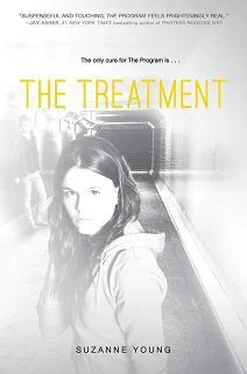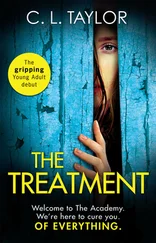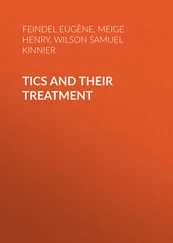With the rise of Program-related arrests, the concern of government interference in personal matters has come up again and again. But as the epidemic rages on, inquiries into The Program’s methods continue to be ignored. The focus remains on the success rate of returners and containment of the worsening outbreak.
—Reported by Kellan Thomas
I SWAY, COMPLETELY STUNNED AS pinpricks of fear inject me with panic. Having the creator of The Program know your name is a bit like Death calling out to you. But here he is, the man who ruined our lives, standing in front of me. No one is reacting the way they should. I scoff at his outstretched hand and then look accusingly around at the others. Everything about the world is upended from what it should be: James isn’t here, but the creator of The Program is. This can’t really be happening.
Cas calmly goes to sit next to Dallas, but Realm has angled his body so he can step in front of me if he has to. Although I appreciate it, I’d think he’d want to stop the madness happening right now. But he’s just standing here.
“Why are you here?” I demand from the doctor. He looks at his hand and lowers it. My body begins to tremble, and I’m sure he can see it. “What more could you possibly want from us?” I ask.
“First let me assure you that I have no intention of harming any of you. In fact, as Dallas can tell you, I’m here to help. We all want the same thing, Sloane. An end to The Program.”
“You expect me to believe that?” I snap. “You ruined my life. You’re a monster!” I spin, looking around at the others in the room. “What is wrong with all of you?”
“Hear him out,” Cas says. “You don’t know the whole story.” I shake my head in complete and utter disbelief.
“Thank you, Mr. Gutierrez,” the doctor tells him, and turns back to me. “My dear,” he continues, and I cringe under his caring tone, “you are the perfect example of why The Program can never truly work. It’s in your personality to fight for what you believe in, what you love. The Program will fail because, although it can erase memories, the basic personalities remain unchanged. This leads to repeating the same behaviors, and ultimately, the same risks and mistakes.”
What he’s describing sounds like my and James’s relationship. It reminds me that if we fought before and failed, we were stupid enough to try again. “There’s no way I’d ever trust you,” I tell Dr. Pritchard. “I don’t want your help.”
“I’m afraid you don’t have another choice.” He looks at Dallas. “I know you contacted me in hopes of better news, Miss Stone, but your intelligence was correct. The epidemic has spread. There’s a call to action, and The Program is using this to further their agenda.”
It feels like the world has dropped out from under me. Before he killed himself, Liam had told me about his cousin—an adult—who committed suicide. He was raving about the epidemic spreading, but I attributed it to his depression. I thought he’d gone crazy. But Liam was right.
Dr. Pritchard takes a stark white handkerchief out of his pocket and wipes the sweat that has begun to gather on his brow. He loosens his tie. He sits on a stool in the front of the room as if he’s a teacher and we’re his class. I’m ready to run, find James, and get out of here.
“There have been several incidents of termination just this morning,” the doctor says. “Young men and women in their early twenties, no known exposure to stimulus. Now The Program is evolving to combat the worsening epidemic. There was a story that ran a few weeks ago, but it was quickly buried.”
“What are you going to do?” I ask. What sort of action is The Program proposing? How much more can they take from us?
“No,” the doctor states. “Not me. I may have created The Program, but I lost control of it months ago. It’s a corporation, bought and paid for by the U.S. government—and they expect results.”
Could The Program be worse than we thought? Is that even possible? Next to me Realm remains quiet, but his turned shoulder looks less like protection now. He doesn’t want Arthur Pritchard to notice his face. Secrets. Realm is full of secrets, and I don’t think I can take any more at this point.
“What are they planning?” I ask the doctor. The fight has gone out of my voice, replaced with fear.
“Mandatory admittance,” Dr. Pritchard responds. “Everyone under the age of eighteen will go through The Program. That means, before graduation, every person will be erased and re-created as a well-balanced, well-behaved individual. Complacency. An entire generation lost—as I’m sure you feel now, Miss Barstow.”
Mandatory admittance for people who aren’t even depressed is like mass brainwashing. Some sick and twisted version of utopia. There’s no way the public would let that happen. Right?
The doctor continues. “The Program is trying to jump-start new polices. They’ve shown they are one hundred percent effective, proven their preventative measures work. And so now everyone under eighteen will be changed—for better or for worse—against their will. Think of what they can do with that much control,” he says. “Think of what they can create from a society without any experience, any learned mistakes. People without connections.”
“Then stop it,” I say forcefully. “If you tell the government what’s really going on with The Program, they’ll put an end to it.”
“And there lies my dilemma,” the doctor says, clasping his hands together under his chin. “Like everyone who works for The Program, I have a gag order—a binding contract that gives them the right to take my memories—to wipe the slate clean if I violate the confidentiality agreement. Only they won’t stop there—not with my security clearance. They’ll lobotomize me,” the doctor says. “The Program considers some returners, and others like me, beyond help. When brought back into The Program, a patient’s evaluated. And if erasure isn’t an option, they’re subject to a lobotomy. It’s the last resort of an otherwise flawless operation. It’s how The Program keeps their success rate at one hundred percent.”
Realm’s hand closes around mine, but I can barely feel him. It’s like the edges of my reality are breaking apart. “Then what?” I ask weakly.
“Their entire personalities are stripped and they’re institutionalized. They’re wiped off the map, my dear. Evaporated into thin air.”
No, it’s too cruel. It’s too cruel to be a real possibility. “How can any rational human being inflict this on another? How can this happen in a civilized world?” I ask.
“Haven’t they done it before?” the doctor asks. “Years ago, when physicians didn’t know how to treat the mentally ill, they began shock therapy, and in extreme cases—lobotomies. They would poke holes in their brains, Miss Barstow. Human beings are cruel creatures. And what we don’t understand, we tamper with until we destroy it. The epidemic is forcing the world to focus on mental disease, but they’ve twisted it into something to be feared, rather than treated. I’m afraid the public support is not behind you on this. We’re in the middle of an epidemic killing our children. You have no idea how far the world will go to stop it.”
He’s right. I know he’s right, but all I want to do is scream that he’s a liar. I want James to burst in and call, “Bullshit!” and punch him in the face. But that doesn’t happen. Instead loneliness and terror bind together to consume me.
“We make no difference compared to the many they can save,” Arthur Pritchard says. “And if I go to the press, give The Program any indication that I’m no longer on their side, they will neutralize me. I need to complete my work before they do.”
Читать дальше












